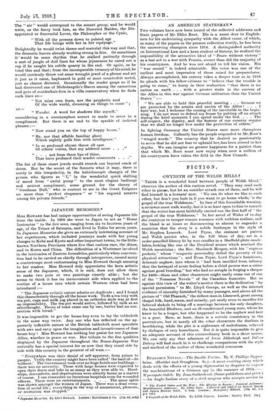JAPANESE MEMORIES.•
Miss HOWARD has had unique opportunities of seeing Japanese life from the inside. In 1900 she went to Japan to act as " Home Instructor " to the five sons, ranging from six to fourteen years of age, of the Prince of Satsuma, and lived in Tokio for seven years. In Japanese Memories she gives an extremely interesting account of her experiences, which included journeys made with her young charges to Kobe and Kyoto and other important towns, to the little- known Northern Provinces where live that curious race, the Aims, and to Korea and China. The difficulties of a Westerner involved in the intricacies of Eastern formalities, particularly when conversa- tion had to be carried on chiefly through interpreters, caused many a contretemps most embarrassing to Miss Howard though amusing to her readers. Miss Howard duly appreciates the keen artistic sense of the Japanese, which, it is said, does not allow them to make two pots or two paintings exactly alike ; but she seems to think it has its inconvenient side when applied to the routine of a house into which certain Western ideas had been introduced :-
" The Japanese artistic nature admits no duplicate ; and I found this characteristic through all the house work. To fit a tea-tray with tea-pot, cups and milk jug placed in an orthodox style was at first an impossibility. The tea-pot would arrive, followed by milk as an afterthought. Pieces of toast came one by one, butter had no con- nection with bread."
It was impossible to get the house-boy even to lay the tablecloth in the same way twice. Any one who has reflected on the ap- parently inflexible nature of the British tablecloth must speculate with awe and envy upon the imagination and inventiveness of that house-boy ! Miss Howard has nothing but praise for our Japanese Allies, whether in peace or war. Her tribute to tho fine qualities displayed by the Japanese throughout tho Russo-Japanese War naturally has a special interest for us now that they stand side by side with this country in the greatest of all wars :—
" Everywhere was their denial of self apparent, from prince to pauper. Verily the country might have been called the land of—do without. The Government took over no huge hotels nor buildings— there was no necessity. Those with large houses were expected to open their doors and take in as many as they were able to. Hard- ships, discomforts, and-deprivations were silently borne as a matter of course. I can remember no luxurious hospitals even for wounded officers.. There were no entertainments. . . . The same spirit was shown amongst, the women of Japan. There was a dead cessa- tion of social life ; everything in the way of amusement, pleasure, or recreation was stopped."
• Japanas Memories. By Ethel Howard. London : Hutchinson Q. Co. [12s. Gd. not


























 Previous page
Previous page